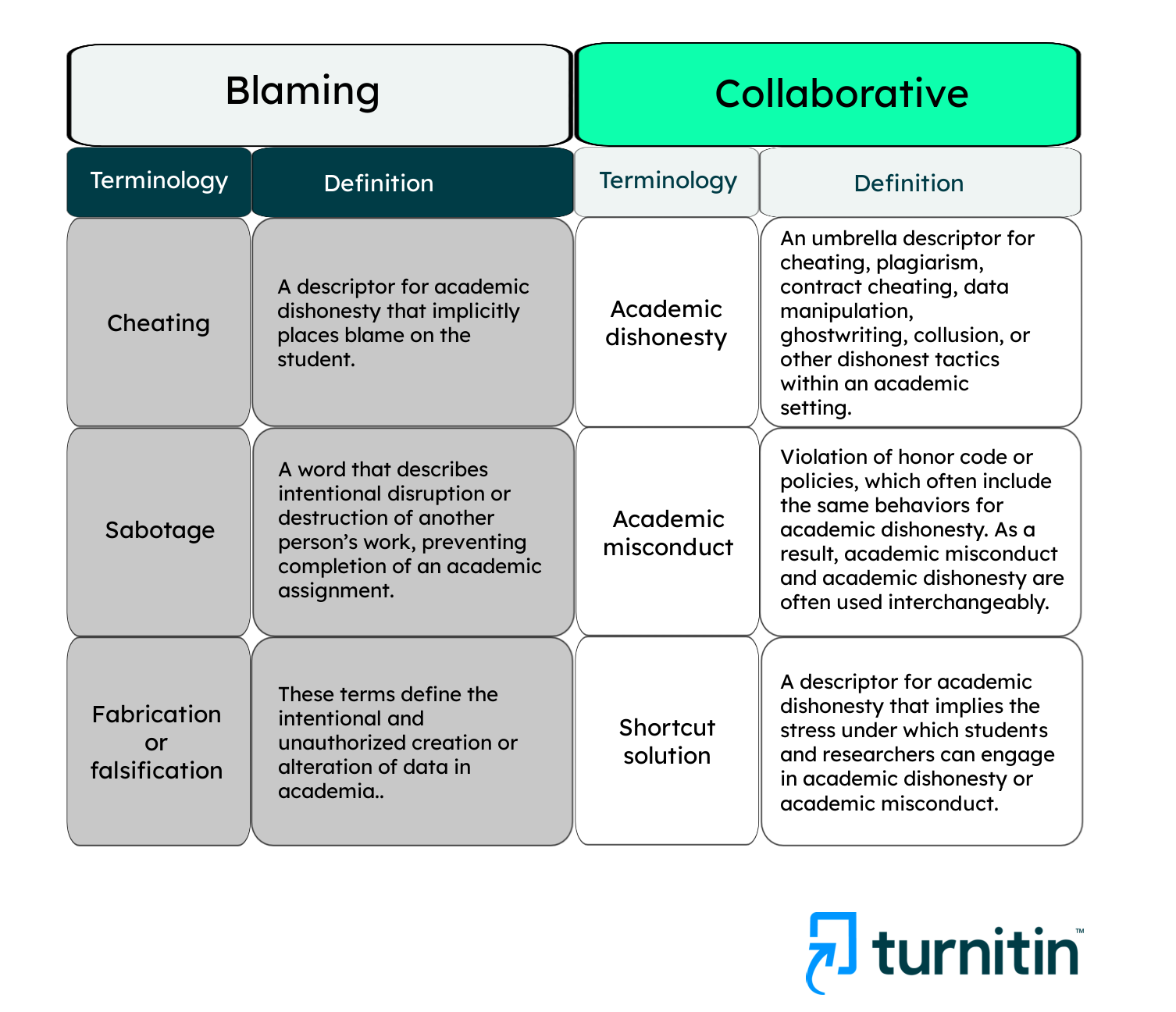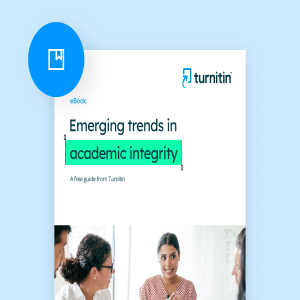Aligning our understanding of definitions of academic integrity is important to promoting lifelong learning throughout the world in a post-industrial marketplace of ideas. Schools used to prepare students for jobs in an industrial world, ensuring that they understood procedures and hierarchy. But these days, the goals are different: academic institutions want graduates to display higher-order thinking, and employers want to hire people who can communicate original, innovative ideas. It may feel like a leap to link academic integrity terminology to learning outcomes and global equity, but in this post, we examine the connection between terminology and equity.
To start, academic integrity is important to teaching and learning. It ensures that feedback loops between students and teachers are based on accurate data. It promotes respect for learning. And it supports a life of honest workplace behavior.
Synchronizing terminology (such as the ENAI's Glossary for Academic Integrity's work) and understanding the pedagogical context for evolving vocabulary are also components in supporting positive outcomes.
“Academic integrity,” a term popularized by researcher Dr. Donald McCabe in the early 1990s, describes work that displays honesty, trust, fairness, respect, responsibility, and courage per the ICAI. However, these values are dependent on cultural context–and the fact that academic integrity has been defined by the West must be acknowledged. In cultures that focus on rote memorization as a learning methodology, mimicry (repeating what is learned, often without attribution) may be a form of respect.
The nuances of cultural context play into terminology. For instance, while in the West “academic integrity” is an oft-used term, it isn’t as common in many regions where mimicry and respect go hand-in-hand, thus clouding the definition of plagiarism. According to research, for example, “the Latvian academic terminology database AkadTerm does not include terms such as academic integrity,’ ‘academic honesty,’ and ‘academic misconduct’” (Tauginiené, et al. 2019).
As recently as 2016, Wheeler states, “Although ‘morality’ has long been taught in the Japanese educational system, academic integrity is a concept that has only recently received much attention and one that is not altogether well understood” (Wheeler, 2016).
Professor Tosh Yamamoto’s 2021 Turnitin interview verifies that finding when he states, “Academic integrity is, I believe, a philosophical mindset to reflect the learning mind to the mirror of honesty, sincerity, contribution to the future society, and also scientific attitude and ethics and morals. However, on the other hand, education in Japan is focused on rote memorization and regurgitation and understanding” (Yamamoto, 2021).
At the same time, contextual knowledge also drives the content of academic integrity. As research into academic integrity and pedagogy expands, so does terminology to match evolving mindsets and approaches. One pedagogical trend is an attempt to be more holistic about why and how these behaviors occur and to stop “blaming students” for these outcomes. Thus, “cheating,” while widely used as a synonym for academic misconduct, is going out of vogue as pedagogy pivots away from a “blaming” and “policing” culture towards more neutral terminology. When someone breaches academic integrity, it is called academic misconduct or academic dishonesty, which Allemand describes as “any sort of unfair advantage” (2012). These words have supplanted older terms like “cheating.”
One of the largest shifts in pedagogy has been a pivot towards collaboration between teachers and students. Helping students feel seen and supported is the opposite of an adversarial, hierarchical, blaming culture. Helping students feel seen and supported also increases learning outcomes.

The word cheating, for instance, falls into the “Us versus Them”-themed terminology. As Zachek describes in their research, “One student in Helgeson’s (2002) study incorporates this concept into their response about how faculty handle cheating, stating, ‘It’s kind of like ‘students vs. teachers’ and we help each other out’” (Zachek 2020, p. 110).
Shortcut solutions is also a term that leaves room for understanding pressured, struggling students. Cheating, for instance, is a “shortcut solution,” which is a milder term to define when students shortchange learning, whether via contract cheating, plagiarism, or getting the answers to a test before the assessment date. In the realm of research, it includes ghostwriting, removing authors, and self-citation with the intent of boosting one’s own impact factor.
Understanding why and how students cheat has become a part of the discussion around academic integrity. Terminology has, as a result, become more neutral, and reflects the way educators have approached misconduct. The current understanding is that sometimes, people don’t set out to cheat, plagiarize, or otherwise misrepresent their work. And that ultimately, plagiarism can become a teachable moment.
Consequences of not defining and aligning terminology, globally:Academic integrity is linked to education integrity. The following are some examples of academic integrity’s importance:
- We need accurate measurements of student learning (i.e., to ensure the student’s answers are their own), not only to foster their next steps but also to inform curriculum
- Research is a cumulative, interactive process—we must ensure that research is honest to promote innovation and void of fraud.
- Respect for the learning process is critical for life-long learning.
In a day and age when education leads to opportunity, and where students, post-education, have goals of entering a marketplace of ideas, original thinking is critical to success for both students and institutions. Academic integrity is an indicator of future workplace success and honesty–and thus a proven starting point for a life-long journey of learning. It is necessary to ensure that academic integrity terminology follows current pedagogy and that it not be entirely punitive, because learning must happen at all points of learning, even at instances of misconduct.
What is the consequence of not having aligned definitions of academic integrity terminology? Global inequity.
When definitions aren’t aligned, international students, or those students who come from cultures that operate under different definitions, suffer.
According to Zachek’s research, “In looking at the demographics of who cheats, one of Beasley’s (2016) primary concerns is if students of minoritized racial backgrounds are more likely to be reported due to institutionalized racism. To this end, Beasley (2009) reports that, ‘International undergraduates were much more likely to get reported for academic dishonesty than were domestic students’” (Zachek 2020, p. 113).
Specific studies focusing on Japan indicate that these differing definitions and cultural contexts impact attitudes and instances of misconduct. “Terminology is always cultural [sic] specific, and it often [sic] impossible for words to be perfectly translated across languages. Furthermore, it may be the case that some cross-cultural studies have inconsistent results if they neglect to take into consideration the varying lifestyles, societies, and cultures of the participants when making comparisons. Therefore, it is likely more valuable to conduct surveys of attitudes within one cultural setting” (Teeter, 2014, p. 104).
East Asia is no exception; studies focused on Turkey also reflect cultural differences. “Returning to the subject of cultural differences, academic integrity may be associated with community values. To demonstrate this, we provide an example from Turkey, where it is a not [sic] an uncommon practice in recent times to deal with ‘academic integrity’ under the umbrella term ‘values education’, especially in the case of providing awareness of ethical issues (e.g. Cihan 2014)” (Tauginiené, et al., 2019).
Thus, academic integrity terminology is critical to academic success. And ensuring inclusive terminology is critical to creating equal opportunities for academic success and upholding the reputation of institutions everywhere.
Reframing academic integrity and misconduct to center the learning journeyAccording to an article in the Journal of Academic Ethics, “A consistent understanding and the use of agreed terms allows the prospect of a shared set of values. It also allows a possibility of developing internationally acceptable common solutions relating to teaching methods, content and preventative strategies for academic misconduct. Reaching agreement on these fundamental concepts would in turn lead to alliances between various fields of science. However, to achieve this, variations in the conceptualization and use of key terms need to be discussed and agreed” (Tauginiené, et al. 2019).
Taking into consideration cultural norms and differences, and ensuring that terminology is widely agreed upon would promote a shared understanding and positive learning outcomes so that international students and researchers alike readily and more easily adhere to global standards. “Academic integrity” is a starting point for lifelong learning, so it’s essential to understand exactly what it means and looks like, and to leave little room for interpretation.
Likewise, terminology for “academic misconduct” can also decriminalize language. This shift is important in ensuring that academic misconduct is not merely punitive but an opportunity for further learning and corrective action.
Doing so advances humanity. Original ideas and respect for attributing ideas is critical to the global, post-industrial world in which we live today; when we share ideas, we need to do so with the assurance that credit is given where necessary. Together, as a community, we can move forward together with comfort and confidence in academic integrity.




